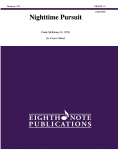Komponist:
Rossini, Gioachino Arrangeur:
Semeraro, Donato Besetzung:
Blasorchester • Chor
Genre:
Klassik • Transkriptionen Produktart:
Partitur • Stimmensatz The Messa di Gloria (Mass of Glory) is among the most beautiful works that the not yet thirty-year-old Rossini composed in the fruitful period in which he worked in Naples (the years of "La donna del lago" and "Maometto secondo"). This work was an instant success. The first performance of the Messa di Gloria for soloists, chorus and orchestra took place in Naples on March 24, 1820, in the San Ferdinando Church. The relationship between Rossini and sacred music has always been a constant of his compositional career: think, for instance, of the youthful Messa di Ravenna. But many years passed before the composer from Pesaro, especially after the study of the religious works of Haydn and Mozart for whom Rossini had an authentic veneration, reached an experience in stylistic and dramaturgical research that not only flowed into his major operas, but also in his sacred music, starting from that masterpiece that is the Petite Messe Solemnelle. There is not much information on the commission of Rossini’s Messa di Gloria, which, according to the Journal of the Kingdom of the Two Sicilies of March 31, 1820, was composed "as a token of devotion for the archconfraternity of San Luigi." This sacred work consists only of the first two sections of the traditional Catholic mass, that is Kyrie and Gloria; it therefore does not include the Credo, the Sanctus, the Benedictus, and the Agnus Dei. In this arrangement for choir and band by Donato Semeraro, the Kyrie and Gloria are followed by Gratias agimus tibi, Qui tollis, and Cum Sancto Spiritu. Orchestrally very lively, the Messa di Gloria is influenced by the operatic style that distinguishes Rossini also in his sacred compositions (above all, the Stabat Mater), particularly in the first number, the Gloria.
Folgende Optionen können gewählt werden um diese Ausgabe zu konfigurieren:



